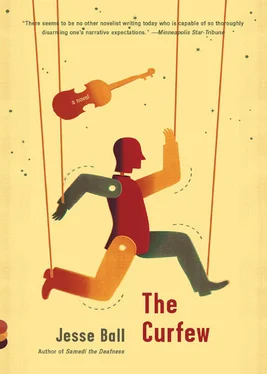He sat there, with the crumpled sheet in his hands. An address. He had not gone to someone’s address in a long time. He didn’t even know how to begin to do such a thing. And this, if he went there at eight, it would mean returning after curfew, a danger in and of itself — such a danger as he had not taken on in years.
Any danger to himself seemed to be a danger to Molly. But wasn’t that just an excuse for cowardice?
And Louisa, if he could learn something of Louisa. He felt again as he had on the day she vanished, and the feeling of waiting, restlessly waiting, was fresh upon him, but tinged now with a dire, hopeless grief. He shook his head as if to cast off a weight.
The day before, Molly had handed Will a piece of paper. That piece of paper did not have an address on it. That piece of paper had said:

I am an elephant today. I will need to have lots of
room and also a bowl of water on the floor.

William had taken the largest mixing bowl from the cupboard, filled it with water, and set it on the floor.
He had found some cardboard also and wrote on it:
ELEPHANTS ONLY.
This he had put near the porcelain bowl.
Was he becoming a coward?

And if he was, then what was the worst of it—
that there is nothing worse than to be the daughter of a coward! or so it seems to the coward.

William ate the rest of his lunch in silence. He put what he had learned in a box and he shut that box. To do otherwise would be to give signs that he had learned something, some new information, and such behavior — indicative of new information — is what alerts those who seek after traitors. He could not even consider having learned that which he had learned, which after all was practically nothing. Just an idea, a hope of an idea. Away with it for now.
He had ordered pea soup with sourdough bread. The pea soup was very peppery and that pleased him, but he was not happy with the spoon he had been given, which was rather shallow for soup eating. He began to dip the bread in the soup, and in between bread dipping he would take spoonfuls. He had measured it out so that when he had the final taste of soup, it would be accompanied by the last bite of bread. However, the spoon’s shallowness made the whole proposition laborious in the extreme.
Unbidden, the thought of Gerard came again. What could he know?
He should not go. He wouldn’t. It was out of the question. But of course, of course, he must go.
Yes, there are times when something is asked of us, and we find we must do it. There is no calculation involved, no measure of the necessity of the thing itself, the action that must be performed. There is simply an acknowledgment that we will do the thing in question, and then the thing is done, often at considerable personal cost.
What goes into these decisions? What tiny factors, invisible, in the jutting edges of personality and circumstance, contribute to this inevitability?
The restaurant was quiet. A couple, sitting across from him, was whispering. On the table in front of them sat a decanter full of water. He could see the woman’s face through the decanter, but distorted. It appeared to him that she was crying, but then she moved in her chair, and he saw that she was not.
The waiters were standing together by the door to the kitchen, and they also were conferring quietly.
There was a little breeze, like the movement of a finger, and it came and went.
I was a great violinist, thought William. What does that mean?

He returned the same way. He could see the gate from a ways off, and through the open door, the double chair. The back of Oscar’s head was visible. The light came through the open door, making an oblong area that placed the chair in a sort of spotlight.
There is a space in the playing of a virtuoso piece where the violinist must cease to think about the music, must cease thinking of fingerings, even of hands and violins, where the sound itself must be manipulated directly. At such times even to remember that one has hands, that one is playing , is disastrous.
William had stood many times before an audience, playing such pieces, and it was in this way that he sought to control the very passage of his life, deftly and without forethought, yet precisely and with enormous care. Part of it was to allow what was enormous, what was profound, without limiting it.
And if he should be forced to give up music? He had been. And if he should be forced to lose his wife? He had lost her.
He came closer now, and saw the gate, and the wall, and the gatehouse. The whole thing was simply to have people be watched. To delineate areas in which people felt watched and areas in which they didn’t. It was one more surface on top of the other surfaces.
He paused there by the wall to consider his position.
An hour passed, and the sun weakened by the gate. In the long afternoon, people of every kind passed by.

A young woman with a very short skirt and a thin blouse came out of a building in the distance. Because she was so beautiful, he saw her from far away, and for the same reason, he watched her as she came all down the road and through the gate. She wore her beauty very carelessly, and she left no one unaffected.
She was on the verge of dropping some of the things she was carrying, and in fact did drop them, at various points in her approach to the gate. But each time, someone came and picked up whatever it was, and handed it to her, and she accepted it, and appeared surprised each time that something should fall from her hand.
When she came closer, William saw that one side of her face was horribly deformed. That was why she had been dropping things — she had to walk in a very special way in order to keep one side of her face hidden from the crowd on the sidewalk.

To the next appointment he went hurriedly. He did not hurry out of worry that he would be late, but because it was the appearance of virtuous citizens — hurrying.
He found the house near the rail station. It was a large building with many apartments. Outside there was a huge signboard. It said,
VERACITY IS UNAVOIDABLE
in thirty-foot-high letters. Underneath in small letters, it said, Government Ministry 6. William had often wondered where the Government Ministries were situated. Their locations were not publicly known. The system was virtually invisible.
He was waved on by the doorman, who wore a remarkable gold-stitched uniform. There was no elevator. Instead — a grand staircase usually reserved for descending.
Many fine lamps here and there. Apartment 3L. He knocked.
A girl in a dressing gown opened the door.
— Come in, Mr. Drysdale.
William nodded.
— We are aware of you, she said, and walked ahead of him to the living room.
There, an elderly couple, her parents, sat amidst lavish furnishings. She sat, and he did the same.
The elderly couple inspected him quietly.
— He was her husband, you see.
— Our son-in-law.
Читать дальше














